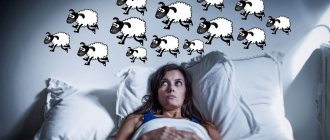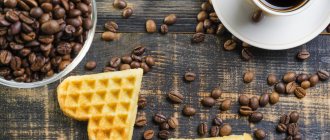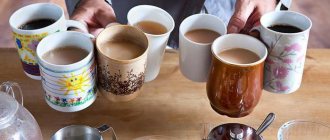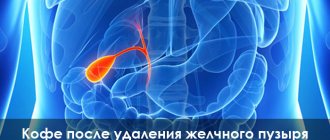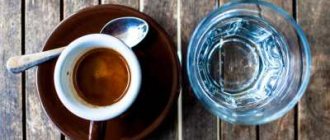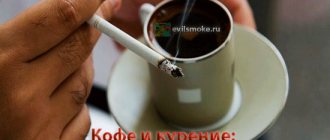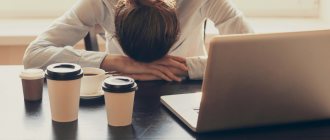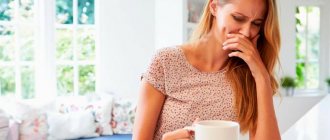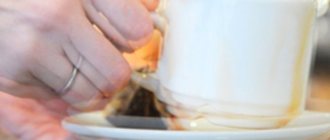Experts do not recommend drinking coffee in the evening, because such a habit can cause insomnia. However, some coffee drinkers may experience the opposite effect. Let's study the issue in detail.
Lovers of the invigorating drink often do not follow any recommendations. They drink coffee several times a day and even before going to bed. Interestingly, espresso affects everyone differently. Some people, after a cup of strong drink, toss and turn all night and cannot sleep. Others sleep without feeling any impact. Still others - after drinking coffee before bed, they fall asleep as if they had taken a sleeping pill. It turns out that the drink does not invigorate everyone. For some connoisseurs it has the opposite effect. Next, let's look at how coffee affects sleep if you drink it at night.
How does insomnia affect the body?
Sleep plays a big role in a person's life. It is during sleep that the process of restoration of all body functions and rejuvenation of the body occurs. Adults need at least seven hours of rest to rest. And for some, nine hours of daily sleep is not enough to renew their strength.
If you do not sleep for the required amount of time, the immune system will suffer first. In addition, a number of other problems may appear:
- mental disorders of various etiologies;
- stressful conditions, depression;
- hypertension, diabetes, hormonal disorders;
- obesity or vice versa - anorexia.
There are many reasons for insomnia, one of the most common is excessive coffee consumption at night.
Moderate consumption of the aromatic drink (about three cups per day) only benefits the body. Insomnia does not threaten those who do not abuse espresso.
Drinking caffeine at night - its effect on the body
Coffee connoisseurs claim that the drink has different effects on people. After all, everyone has their own individual characteristics of the body. Six percent of coffee drinkers feel no impact at all. Even if you drink five cups of espresso a day, you don’t feel an invigorating effect; on the contrary, you feel calm and relaxed, like after soothing green tea. And in the morning there is no feeling of weakness due to lack of sleep.
Such people are simply not susceptible to caffeine; they are immune to this substance. For them, coffee does not help activate the physical capabilities of the body.
Coffee at night can cause insomnia for some. This is due to the process of blocking the hormone adenosine, melatonin. These neurotransmitters are responsible for relaxation of the body and good sound sleep. If caffeine makes you feel alert, then you should not drink strong drink after six in the evening. In addition, due to its diuretic effect, you will have to wake up several times a night for little need, which also negatively affects the quality of sleep.
Many may be interested in the question: is it possible to drink coffee with milk at night? Thanks to the mild effect of latte or cappuccino on the body, you will not feel a pronounced invigorating effect. Caffeine diluted with milk will slowly enter the bloodstream and have an imperceptible effect on the nervous system, blood vessels, and heart muscle. It will not prevent you from falling asleep or affect the quality of your sleep.
But a strong drink paired with grapefruit juice or the fruit itself can increase the effect of caffeine. Therefore, a sleepless night after such a meal is guaranteed. The substance that is found in this citrus fruit has a direct effect on the liver. It can block the active liver enzyme that processes caffeine. As a result, there is an increase in brain function and physical activity.
Caffeine is a powerful stimulant of brain activity; it can increase a person’s performance and help stay awake if necessary. This substance directly affects sleep. By drinking coffee before bed, you can feel a surge of energy. Many people know about the properties of the drink and use it, for example, students before a session, drivers, night watchmen.
It was noticed that when drinking espresso in small quantities (2-3 cups per day), the body’s performance increases. And if you drink five or more cups a day, then the opposite effect of coffee occurs - you want to sleep.
“Coffee sleep” is the best way to cheer up
If you just can’t wake up, you feel tired and overwhelmed, and there is no way to rest, there is a sure way to help you. Scientists advise making yourself a strong espresso, drinking it quickly and lying down to rest for 15 minutes. After this, your energy should return.
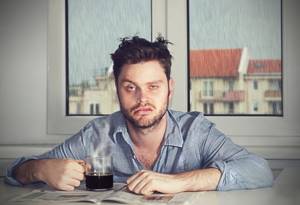
Early in the morning, and sometimes throughout the day, especially after lunch, many people feel sleepy. To cheer up, some people prefer to sleep a little, while others return themselves to working condition with the help of caffeine. Vox suggests combining these two methods and explains why a cup of coffee along with a 20-minute nap gives the best invigorating effect.
How does the “coffee dream” work?
It would seem that coffee should invigorate us and keep us from falling asleep. However, caffeine works a little differently than we imagine. Through the small intestine it is absorbed into our blood and then travels to the brain. There it is integrated into receptors that usually pass through a molecule of a similar shape - adenosine.
Adenosine is a byproduct of our brain function. When its levels are high enough, it connects to these receptors and we feel tired. If caffeine blocks access to the receptors, adenosine will not be able to enter them. Stephen R. Brown, in Buzz: the Science and Lore of Alcohol and Caffeine, writes that it's like blocking the brain's main inhibitory mechanism.
At the same time, caffeine does not block all receptors at once: it competes with adenosine for integration into them, and fills only some.
How does sleeping after coffee help with this? Sleep itself clears the brain of adenosine. However, if you sleep for more than 15-20 minutes, your brain may enter deep stages of sleep, after which it takes some time to wake up. If you fall asleep for a short time, your body will have time to cleanse itself of adenosine and make room for caffeine, which just needs about 20 minutes to get through the small intestine and blood vessels to the brain. As a result, caffeine will make you even more alert.
Scientific Evidence for the Coffee Sleep Method
This theory is based on existing data on the effects of sleep, caffeine and adenosine on humans. Scientists have conducted a number of experiments that have shown that coffee combined with a short nap is more effective than just coffee or just sleep.
In the study, scientists from Loughbourne University in the UK asked participants who were feeling tired to drink coffee and then take a 15-minute nap. Afterwards, they took a test in a driving simulator. Participants made fewer errors after the coffee nap than after simply drinking coffee, taking a short nap, or taking a decaffeinated placebo. The effect was the same even if they could not fall asleep or were half asleep for the entire 15 minutes.
Effect of theobromine on sleep
The composition of coffee beans has not been fully studied. Everyone knows that the main active ingredient is caffeine. Few people have heard of theobromine. This component is also present in grains. The substance is a white powder with a bitter taste.
This powder is widely used in medicine. It is useful for the treatment of colds of the bronchi and lungs. Another component is added to toothpaste to improve the condition of the enamel. Scientists have found that theobromine has properties similar to caffeine. In particular, the substance enhances the work of the heart muscle and has a diuretic effect.
In large quantities, the powder can cause poisoning. But when drinking coffee, chocolate, cocoa, it is impossible to reach the limit to cause intoxication. An adult needs to reach a concentration of 1000 mg per kilogram of live weight. Which means, if an individual weighs 60 kilograms, then he needs to eat at least 25 kilograms of chocolate.
Theobromine is also found in foods such as nuts and Coca-Cola. It has a hypnotic effect on the body. Thanks to this substance, many coffee lovers feel a calming effect. Let's find out more reasons why coffee makes you sleepy.
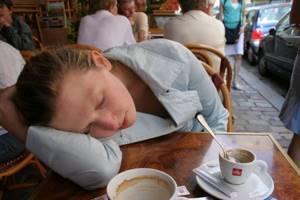
- As mentioned above, theobromine in coffee is the root cause of the relaxing effect. Many manufacturers, when processing coffee beans, extremely thin the protective shell. This is where caffeine is found. The core remains, where theobromine is located.
- If you have health problems, if there are disturbances in the functioning of the adrenal glands, then after coffee you want to sleep.
- When overdosing on espresso, coffee connoisseurs who are already accustomed to caffeine experience a hypnotic effect.
- Diseases of the liver, pancreas, and the presence of the Epstein-Barr virus have the opposite effect from coffee.
It is for these reasons that doctors do not recommend drivers to drink espresso before a long journey. There is a risk of falling asleep while driving.
If you want to achieve not the soporific effect of espresso, but a surge of vigor, then choose robusta beans for the drink, it contains more caffeine.
Darkening of teeth
“Over time, your teeth can darken, and coffee is a major culprit,” explains Jim DiMarino, dentist and medical director of Oral Health. “Coffee is rich in color pigments called chromogens, which when consumed frequently cause darkening of the enamel.”
A number of factors: a condition has been named for receiving a pension of more than 30 thousand rubles
TikTok followers support Scottish postman's song about sailors
Hybrid aircraft engines will reduce nitrogen oxide emissions by 95%
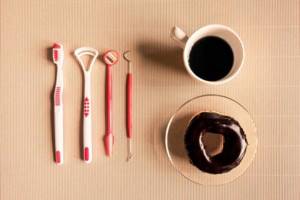
What are the signs that indicate that coffee interferes with sleep?
After drinking coffee for a long time, it is difficult to give up your favorite drink if you have problems sleeping. Still, you need to listen to your body and start taking care of your health. The following reasons may be a good reason to avoid drinking strong drinks at night.
- In the evening you feel tired, but you can’t fall asleep for a long time.
- Sleeping pills take pride of place in the first aid kit; without it you cannot plunge into the kingdom of Morpheus.
- The sleep is shallow, you wake up more than three times during the night, and you feel tired in the morning.
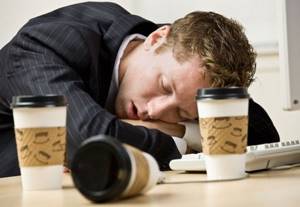
All of these signs are a reason to change the dosage of caffeine consumption to a lesser extent. Try drinking strong espresso only in the morning. It is advisable to give up coffee in the afternoon. The drink has many beneficial properties, but when it comes to health, it is necessary to adjust the norms of its consumption so as not to aggravate the situation.
Coffee is harmful for older people who have problems with the heart and blood vessels.
Why shouldn't you drink coffee at night? Despite the fact that some lovers claim that it is completely harmless, there is definitely no benefit from espresso in the evening. Caffeine affects the body from two to seven hours, and much depends on the characteristics of the person. During the first two hours, the effect is clearly expressed on all body systems. In the subsequent period, the impact will be felt, but not as strong. Some will not be able to sleep through the night due to health problems. And for a healthy person, after a cup of espresso, sleep will come only after 1-2 hours.
Coffee before bed
Drinking espresso and going to bed is a rather strange idea at first glance. However, this is a real-life method of combating fatigue, and it is not only effective, but also scientifically proven. The world is full of ridiculous oxymorons like diet ice cream and sausage cheese, and “caffeine sleep” claims to be the best of them. And that's why.
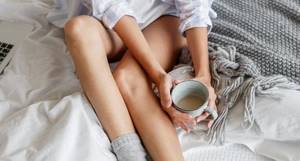
"Caffeine Dream"
The phenomenon was discovered by scientists from Loughborough University in England, who conducted an experiment to combat sleep while driving. They found that a combination of strong coffee and a short rest, no longer than half an hour, immediately after drinking the drink helps tired drivers stay alert. The method is built taking into account the slow and rapid phases of sleep: in 20-30 minutes a person manages to fall into a shallow sleep, the body relaxes and receives minimal “recharging”. During this same time, caffeine is absorbed into the blood and begins to act just at the moment of awakening. Thanks to this double effect, the level of adenosine in the blood, a neurotransmitter responsible for stimulating sleep and suppressing alertness, decreases. If a person slept too little at night, during the day adenosine will irritate certain receptors in the body and “slow down” its work, protecting against overload and indicating the need for additional rest. It is because of this process that a person who does not get enough sleep is lethargic, slow and works worse. Caffeine is an adenosine antagonist, so the “caffeine sleep” method relieves fatigue for several hours.
The effect of such “charging” is really strong. According to British research, the “caffeine nap” improves driver attention, concentration and reaction time better than all other methods tested in the experiment: coffee only, short naps only, loud music, cooling the air in the car, a break from driving without sleep and caffeine pills . Japanese scientists from Hiroshima University tested the effect of the method on intellectual abilities. In their experiment, participants who practiced "caffeine naps" performed the highest on memory tests. In addition, they felt significantly more alert than participants who took caffeine pills, coffee, or simply slept.
Now - to the practical side of the issue
The procedure for the most effective “caffeine sleep” is as follows:
Important!
Don't sleep for more than half an hour, otherwise you will begin to fall into deep sleep. Waking up in this phase guarantees that you will feel groggy for the rest of the day, which is exactly what you are fighting against.
If you can't fall asleep, don't worry. Even half-napping for 20 minutes with a blindfold will be effective.
If you don't like coffee, use caffeine tablets (in the experiment, scientists gave subjects a dose of 200 mg) or another drink with a high caffeine content. Don't drink soda or energy drinks. One serving of such drinks (250 ml) does not contain enough caffeine for a full burst of energy, but it contains a large amount of sugar, which is very quickly absorbed into the blood. It will prevent you from falling asleep and reaping the full benefits of the caffeine sleep.
